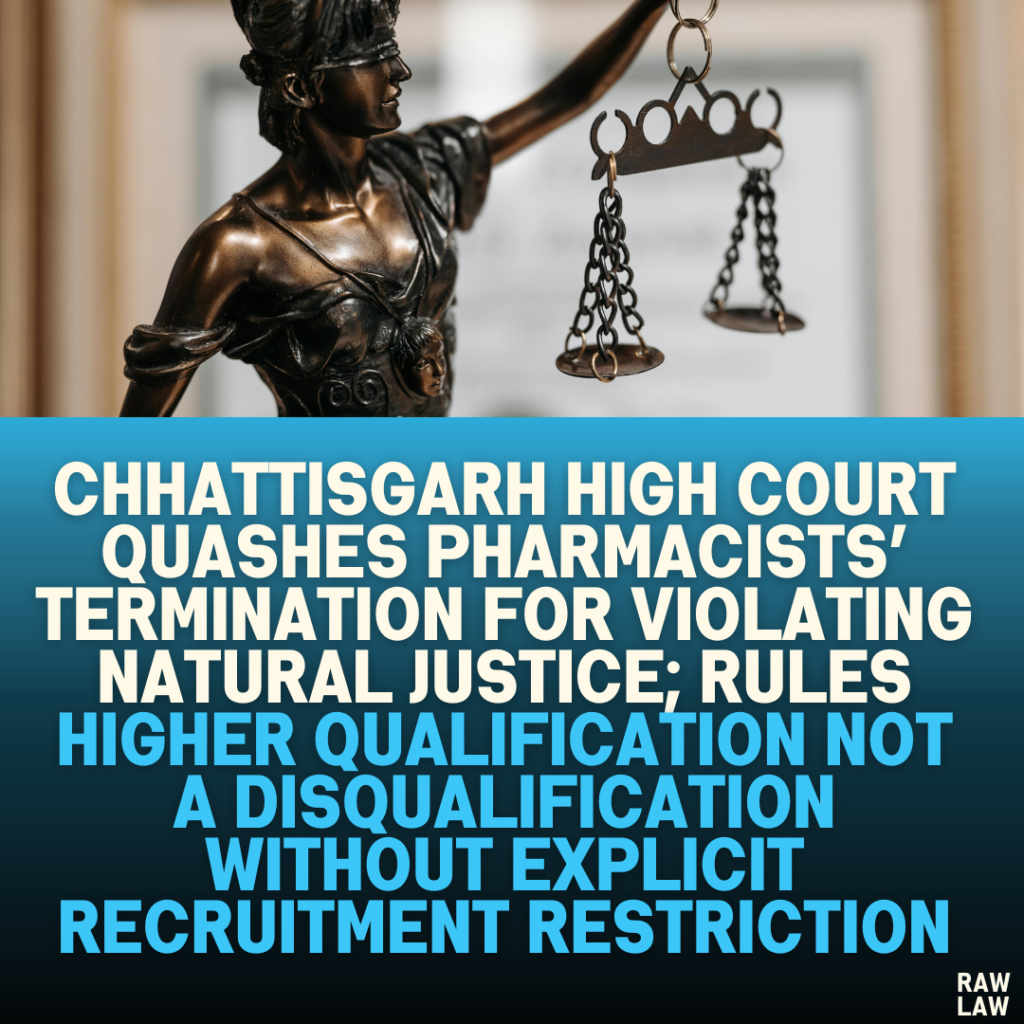Court’s Decision
The Chhattisgarh High Court set aside the termination orders of several petitioners, who were appointed as Pharmacist Grade-II. The court declared the terminations invalid on two primary grounds: the violation of principles of natural justice and the wrongful disqualification of candidates possessing higher qualifications. The court ordered the petitioners’ reinstatement and emphasized the necessity of procedural fairness in administrative decisions.
Facts
- Recruitment and Appointments:
- The petitioners were appointed as Pharmacist Grade-II in 2011 following an advertisement by the Divisional Joint Director, Health Services, Raipur.
- The advertisement required candidates to hold a diploma in pharmacy and be registered with the Chhattisgarh Pharmacy Council.
- The petitioners met the prescribed qualifications and were appointed after a due selection process.
- Confirmation of Services:
- After serving a probation period of two years, the petitioners’ services were confirmed in 2014, as per the Chhattisgarh Public Health and Family Welfare Department Recruitment Rules, 1989.
- Complaint and Inquiry:
- Complaints regarding alleged irregularities in the recruitment process were lodged by a social worker who had no statutory authority.
- Based on the complaints, an inquiry committee was constituted, which recommended terminating the petitioners’ appointments.
- Termination:
- In January 2015, the respondents issued termination orders citing irregularities in the recruitment process.
- The petitioners were not given any notice or opportunity to defend themselves before termination, prompting them to challenge the orders in court.
Issues
- Whether terminating the petitioners without notice violated the principles of natural justice.
- Whether the petitioners’ possession of higher qualifications (Bachelor of Pharmacy) could justify their disqualification.
- Whether a complaint by a non-statutory person could lawfully trigger such drastic administrative action.
Petitioners’ Arguments
- Violation of Natural Justice:
- The termination orders were passed without providing the petitioners with a show-cause notice or a fair hearing, violating Articles 14, 16, and 311(2) of the Constitution.
- Actions leading to civil consequences require adherence to the principles of natural justice.
- Eligibility for Appointment:
- The petitioners met the qualifications prescribed in the recruitment advertisement.
- Their higher qualification (Bachelor of Pharmacy) could not render them ineligible, as it implied greater proficiency.
- Confirmation of Services:
- The petitioners had completed their probation period, and their services were confirmed. The abrupt termination, therefore, lacked legal basis.
- Precedents:
- The petitioners cited judicial precedents to argue that higher qualifications cannot disqualify candidates unless explicitly mentioned in the advertisement.
- They also relied on judgments emphasizing the importance of procedural fairness in administrative actions.
Respondents’ Arguments
- Irregularities in Recruitment:
- The respondents contended that the recruitment process was illegal due to procedural lapses, including the absence of a proper advertisement and violations of reservation rosters.
- Appointments were allegedly made based on a press release instead of a formal notification.
- Show-Cause Notice Not Necessary:
- The respondents argued that issuing a show-cause notice would have been futile, as the petitioners could not have defended the alleged irregularities in the recruitment process.
- Authority of the Complaint:
- The inquiry was triggered by complaints from a social worker. The respondents justified this, citing the need to address potential irregularities.
Analysis of the Law
- Principles of Natural Justice:
- The court emphasized that actions involving civil consequences must adhere to the principles of natural justice. Affected parties must be given notice and an opportunity to respond.
- Higher Qualifications:
- Referring to precedents, the court held that candidates with higher qualifications cannot be disqualified unless the recruitment advertisement explicitly restricts such candidates.
- Role of Non-Statutory Individuals:
- Decisions by statutory authorities influenced by complaints from non-statutory actors are invalid. The court reiterated that administrative discretion must not be compromised by external interference.
Precedent Analysis
- Joint Action Committee of AIR Line Pilots’ Association of India v. Director General of Civil Aviation:
- The court held that decisions by statutory authorities influenced by individuals with no statutory role are illegal.
- Government of Andhra Pradesh v. P. Dilip Kumar:
- The court ruled that candidates with higher qualifications cannot be disqualified unless explicitly stated in the recruitment process.
- Domendra Kumar Sahu v. State of Chhattisgarh:
- This court previously upheld the validity of appointments where candidates had superior qualifications than the minimum prescribed.
Court’s Reasoning
- Lack of Notice and Hearing:
- The court found that the termination orders were issued without adhering to the principles of natural justice. No show-cause notice was given, nor was any opportunity for the petitioners to be heard provided.
- Influence of Non-Statutory Complaints:
- The court criticized the respondents for acting on complaints made by a social worker who lacked any statutory authority to influence the process.
- Higher Qualifications:
- The court reaffirmed that possessing higher qualifications than the minimum prescribed cannot disqualify a candidate. It also clarified that this principle aligns with the objective of administrative efficiency.
- Confirmed Services:
- Since the petitioners’ services were confirmed, their termination without valid procedural grounds was deemed unlawful.
Conclusion
The court quashed the termination orders and reinstated the petitioners. It held that the respondents failed to follow due process and violated fundamental principles of fairness and justice.
Implications
- Reaffirmation of Natural Justice:
- The judgment reinforces the principle that administrative actions must comply with natural justice, especially when they affect individuals’ rights.
- Higher Qualifications:
- It clarifies that higher qualifications cannot disqualify a candidate unless explicitly stated, ensuring fairness in recruitment processes.
- Limits on External Influence:
- The decision underscores that statutory authorities must act independently, free from undue influence by non-statutory individuals.
- Precedent for Recruitment Challenges:
- This ruling will likely serve as a key precedent in cases involving procedural irregularities and unfair terminations in public employment.
